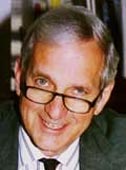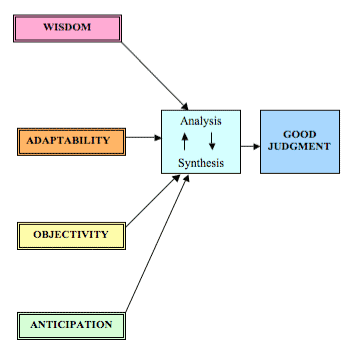Developing Surgical Judgement

Martin McKneally
|
Judgement is defined in Webster's College Dictionary as "the ability to make a decision
or form an opinion objectively (and) wisely, especially in matters affecting action."
Good surgical judgement is highly prized by surgeons, colleagues, patients and their
families.
In this issue of the Spotlight we learn about hepatobiliary surgeon Carol-anne Moulton's
exploration of surgical judgement as a topic of research with our colleague, cognitive
psychologist Glenn Regehr. Her initial scan of surgical opinion revealed that surgeons
find good judgement hard to define, though they can readily recognize it or its
absence. In this column I will try to propose an approach to understanding and teaching
surgical judgement in the hope that practicing surgeons will critique and illuminate
this "zero draft" in a blog on the website (submit comments below). This discourse
should prove at least interesting and possibly helpful as Carol-anne develops her
more formal analysis.
Good judgement might be described as an integrated sum of wisdom, adaptability,
objectivity and anticipation. (Figure 1) Wisdom derives from knowledge and experience,
both the direct experience of the surgeon and the indirect experience derived from
reading and observation of the experience of others. Thoughtful discourse, reflection
and analysis of experience (for example in morbidity and mortality conference) contributes
to the sum of a surgeon's wisdom. Adaptability depends on the surgeon's observational
skills, particularly the ability to detect and interpret faint signals below the
threshold of novices. This leads to what Carol-anne describes as situation awareness.
Flexibility enables the surgeon to adapt to unusual or unanticipated circumstances.
Objectivity is strengthened by training to minimize fear, emotion or bias that might
impair our response to the remarkable challenges of surgical practice.
Anticipation and preventive thinking are a defining element of surgery exemplified
by the application of hemostats before transecting a vessel. Ralph Manktelow's memorable
University Rounds lecture described the mental preparation of elite athletes anticipating
winning performance, and its potential application in surgery. See link: www.surg.med.utoronto.ca/newsletter/newsletterSpring05.pdf
The surgical checklist, a formal summation of required actions based on the wisdom,
experience and judgement of others strengthens anticipation and reduces the need
to expend cognitive resources on routine preventive measures. The element of anticipation
is probably more important in pre-operative and post-operative care. Objectivity,
adaptability and wisdom are more critically engaged during intraoperative decision-making,
especially when unexpected findings or problems arise.
Checklists comprise a unique component of anticipation. Surgeon-essayist Atul Gawande
describes their impact on critical care in the December 10, 2007 issue of the New
Yorker. (www.newyorker.com) In his usual riveting style, Atul recounts the evolution
of the checklist from its origin in aviation. On its first test flight, the B-17
flying fortress stalled at 300 feet, spun and crashed due to "pilot error". An expert
test pilot had found in its ingenious complexity "too much airplane for one man
to fly". The pre-flight checklist that resulted from analysis of that failure became
standard practice in aviation, and the B-17 became the icon of U.S. air superiority
in World War II. "Medicine today is in its B-17 phase: too much for one person to
fly."
The remarkable campaign of Johns Hopkins intensivist Peter Pronovost to prove the
value of checklists in the critical care unit, "the flying fortress of medicine",
is the next story in Gawande's narrative. Dramatic reductions in line infections,
ventilator related pneumonia, medication errors, costs and deaths were demonstrated
at Hopkins, then in Michigan. (1)
|

Figure 1
|
Many states and the entire country of Spain have
adopted this commonsense but still uncommon approach. Resisters, and there are many,
don't want to be "slowed-down" by a checklist or monitored by a nurse for compliance
with practices of indisputably superior safety.
"Slowing down" is exactly what Carol-anne and Glenn call the phenomenon they're
studying. They are analyzing the moment when we switch from reliance on automatic
freewheeling performance of complex tasks -- such as driving or suturing, to mindful,
reflective summoning of additional cognitive resources. We slow down literally or
metaphorically when a crisis requiring our full attention and best judgement arises
in traffic or in surgery.
How should surgeons be taught to develop good judgement? Given the record of our
surgical education program we can be confident that excellent techniques will be
developed from this research project. In the interim we can certainly strengthen
decision-making by requiring resident surgeons to make decisions, commit to expressing
their judgements and recommendations, and give their reasons in precise language
that exemplifies clear thinking, thoughtful analysis and synthesis. Similarly, they
can be required to make and defend intraoperative judgements before they are pre-emptively
guided to the best decision as specified by their seniors or teachers. Exercise
of decision-making rather than rote memorization of routines can help us move from
"knowing good judgement when we see it" to teaching good judgement as effectively
as we teach good surgical technique.
Martin McKneally
Editor
(1) Pronovost P, et al. An Intervention to Decrease Catheter-Related Bloodstream Infections in the ICU. N Engl J Med 2006;355(26):2725-32.
Correspondence
Letters to the Editor are welcomed to keep the community informed of opinions, events
and the activities of our surgeons, friends and alumni.
Family News
In future issues of The Surgical Spotlight we would like to include a section on
our families. Please send us birth and marriage announcements with photographs,
as well as any other family news you would like to share with the Department of
Surgery community.
|